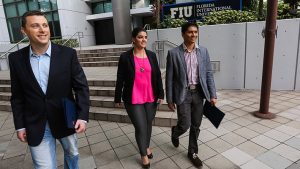Members of financial institutions facing increased pressure from the federal government to comply with anti-money laundering (AML) regulations got good news on February 13, 2007: a new—and possibly unique—partnership between industry and an accredited academic institution will make the task easier. A joint announcement from the College of Business Administration and Florida International Bankers Association (FIBA) to more than 1,000 financial institution representatives revealed a partnership between the two to provide AML compliance training.
The announcement represented the culmination of several years of effort on the part of a number of individuals, with the college’s Emmanuel Roussakis, director, Master of Science in Finance (MSF) program and graduate certificate programs in banking, initiating and facilitating the discussions.
“Marcos Kerbel, chair of FIBA’s education committee and an adjunct professor in the college’s Department of Finance, wanted the college to get involved in AML compliance training, which FIBA has offered for more than twenty years,” said Roussakis, who was the first FIBA-endowed professor, has actively engaged in banking research, and has taught seminars for bank executives and courses in the college for more than 25 years. “I took the initiative to get the college to play a larger role in the training of members of the financial industry in South Florida and to reach out to professionals and executives in Latin América. I had conversations with Simon Amich, president of FIBA; Executive Director Pat Roth, and Kerbel.”
Joyce J. Elam, executive dean of the college and vice provost, FIU Online, made the announcement during FIBA’s Annual AML Compliance Conference. Under the partnership, FIBA will provide the instructors and course materials for the training program and the college will provide space in its Downtown Center and will issue certificates to those who successfully complete course requirements. The intent is to launch the program under the auspices of the college’s Executive and Professional Education (EPE) office, directed by Robert Garcia (EMBA ’97).
“FIBA is one of the leading organizations in the financial arena, offering recognized training programs that bring institutions closer to the high standards regulators impose on banks in the United States,” Elam said. “It is a natural fit for us to partner with such a reputable group to continue enhancing our offerings and grow partnerships with the financial community in Florida and abroad.”
FIBA representatives express their enthusiasm about the significance of the partnership.
“As of late, regulators have been targeting banks that don’t properly mitigate money laundering risks associated with correspondent banking activity, which allows the international movement of funds and is the backbone of global trade,” Amich said. “Through our prestigious partnership with the college, this program will give banking institutions the necessary tools to protect their businesses and be in compliance with federal regulations against money laundering.”
According to Roth, “As far as we know, this is the first agreement in the country between industry and an accredited university to offer an AML compliance certificate. The certificate program reflects the importance to the government of AML and terrorist financing within the financial sector and will enable us to take compliance to another level. Through the certification—which will serve as an outward manifestation of our members’ level of knowledge—we will be able to formalize what many people already are doing.”
“This is a historic occasion for both partners,” Kerbel said. “It shows the commitment of FIBA to education and the commitment of the college to financial services and compliance. There was tremendous interest at the meeting, indicated by the fact that we received about 400 business cards from attendees, many of them from countries such as Brasil, Cayman, Colombia, and Mexico.”
The program will roll out in mid-May, 2007, with plans for an online version to be ready by June, 2007, for members of those institutions based in Latin América who wish to participate and become certified by the college and FIBA. The next step will be to develop the course in Spanish and Portuguese to accommodate the needs of international bankers.




